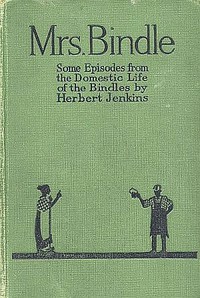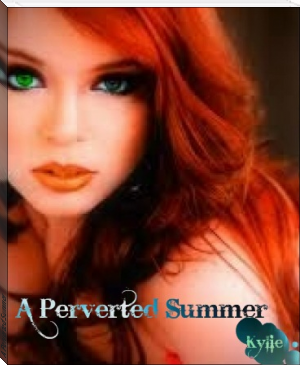Mrs. Bindle: Some Incidents from the Domestic Life of the Bindles, Jenkins [popular romance novels TXT] 📗

- Author: Jenkins
Book online «Mrs. Bindle: Some Incidents from the Domestic Life of the Bindles, Jenkins [popular romance novels TXT] 📗». Author Jenkins
Mrs. Sawney removed the apron from her head, and blinked up at the sky, as if to assure herself that the blessing of sight was still hers.
"The wicked cat!" she vociferated, when she found that no damage had been done. "Come on, let's put it out," she exhorted as, with a swift movement, she picked up the pail and handed it over the fence to the waiting Mrs. Grimps.
Ten minutes later, the fire was extinguished; but the washing was ruined.
Mrs. Sawney gazed across the fence at a dishevelled caricature of Mrs. Grimps, with the full consciousness that she herself must look even worse. She also realised that she had to make the return journey over the fence, under the critical eyes of Mrs. Grimps, and that to climb a fence without an exposure of leg was an impossibility.
Both women were wet to the skin, as neither had proved expert in the handing of brimming pails of water over a wooden fence; both were spotted like the pard; both were in their hearts breathing dire vengeance upon the perpetrator of the outrage, who just at that moment was alighting from a tram at Hammersmith.
Throughout that afternoon, Mrs. Sawney and Mrs. Grimps waited; grim-lipped and hard-eyed they waited. Fenton Street was to see something that it had not[Pg 57] even dreamed of. Mrs. Sawney and Mrs. Grimps had decided unanimously to "show 'er."
Their offspring had been instructed that, at the sight of Mrs. Bindle, they were to return hot-foot and report.
The children had told their friends, and their friends had told their mothers, with the result that not only Mrs. Sawney and Mrs. Grimps; but every housewife in Fenton Street was on the qui vive.
Soon after six there were cries of "Here she comes," as if Mrs. Bindle had been the Boat Race, followed by a sudden stampede of children.
Mrs. Sawney and Mrs. Grimps rushed to action-quarters. Mrs. Sawney gave a stir to a pail of blacklead and water behind the front door, whilst Mrs. Grimps seized a soft broom, which she had saturated in water used for washing-up the dinner-things.
The children clustered round the gate, and hung on to the railings. Housewives came to their doors, or appeared at their bedroom windows. Fenton Street loved Drama, the bigger the "D" with which it was spelled, the more they enjoyed it.
Behind their front doors, Mrs. Sawney and Mrs. Grimps waited and watched. Suddenly the crowd that had attached itself to the railings began to melt away, and the babel of clattering voices died down. Several women were seen to leave their garden-gates and walk up the street. Still the two grim-faced women waited behind their "street-doors."
At length, as the last child left the railings and tore up the street, both women decided that something must have happened.[Pg 58]
The sight of Mrs. Sawney at her door brought Mrs. Grimps to hers, just as Harriet, the nine years old daughter of Mrs. Sawney, rushed up breathless.
"She's comin'," gasped the child, whereat both women disappeared, Mrs. Sawney to grasp the handle of her pail, and Mrs. Grimps to seize her broom.
When Mrs. Bindle appeared, the centre of an eddying mass of children, with a few women on the outer fringe, she was carrying in her arms a child of about five, who was whimpering pitifully. Her bonnet had slipped back, her right hand, from which the biscuit-coloured glove had been removed, was stained with blood, whilst her umbrella was being carried, as if it were a sacred relic, by a curly-headed little lad who was living his hour.
At the sight of the procession, Mrs. Sawney let the handle of her pail fall with a clang, whilst Mrs. Grimps dropped her broom.
"It's my 'Ector," she screamed, as she bolted down the garden path. "Oh, my God! 'e's dead."
"Get some hot water," ordered Mrs. Bindle, as she pushed the mother aside and entered the gate. "He's cut his leg."
Followed by Mrs. Bindle, Mrs. Grimps bolted into the house. There was something in Mrs. Bindle's tone that brooked of no delay.
Watched by Mrs. Grimps, Mrs. Sawney, and several of their friends, Mrs. Bindle washed the wound and bound it up with clean white rag, in place of her own blood-soaked handkerchief, and she did her work with the thoroughness with which she did everything.[Pg 59]
When she had finished, she took the child in her arms, and for an hour soothed it with the assurance that it was "the bravest little precious in all the world." When she made to transfer her burden to its mother's arms, the uproar that ensued decided Mrs. Bindle to continue her ministrations.
It was ten o'clock before she finally left Mrs. Grimps's house, and she did so without a word.
"Who'd 'ave thought it!" remarked Mrs. Sawney, as Mrs. Bindle closed the gate.
"She's got a way with kids," admitted Mrs. Grimps. "I will say that for 'er," and in turning back along the dark hall, she fell over the broom with which she had intended to greet her neighbour.
Mrs. Sawney returned to her own house and hurled a saucepan at Sandy, a circumstance which kept him from home for two days and three nights—he was not a cat to take undue risks.[Pg 60]
CHAPTER III MRS. BINDLE ENTERTAINSI
"Bindle!" Mrs. Bindle stepped down from a chair, protected by her ironing-blanket, on which she had been standing to replace a piece of holly that had fallen from a picture.
She gazed at the mid-Victorian riot about her with obvious pride; it constituted her holy of holies. Upon it she had laboured for days with soap-and-water and furniture-polish, with evergreen and coloured candles, to render it worthy of the approaching festivity. She had succeeded only in emphasising its uncompromising atmosphere of coldness and angularity.
Antimacassars seemed to shiver self-consciously upon the backs of stamped-plush chairs, photo-frames, and what she called "knick-knacks," stared at one another in wide-eyed desolation; whilst chains of coloured paper, pale green and yellow predominating, stretched in bilious festoons from picture-nail to picture-nail.
On the mantelpiece, in wine-coloured lustres, which were Mrs. Bindle's especial glory, two long candles reared aloft their pink nakedness. They were never[Pg 61] to be lit and they knew it; chilly, pink and naked they would remain, eventually to be packed away once more in the cardboard-box, from which for years they had been taken to grace each successive festivity.
It had always been Bindle's ambition to light these candles, which were probably the most ancient pieces of petroleum-wax in the kingdom; but he lacked the moral courage.
"Funny thing you can't be clean without stinkin' like this," he had mumbled that morning, as he sniffed the air, reeking of turpentine with an underlying motif of yellow-soap. "I suppose 'appiness is like drink," he added, "it takes people different ways."
Passing over to the sideboard, Mrs. Bindle gazed down at the refreshments: sausage-rolls, sandwiches, rock-cakes, blanc-mange, jellies, three-cornered tarts, exuding their contents at every joint, chocolate-shape, and other delicacies.
In the centre stood a large open jam-tart made on a meat-dish. It was Mrs. Bindle's masterpiece, a tribute alike to earth and to heaven. On the jam, in letters contrived out of strips of pastry, appeared the exhortation, "Prepare to Meet Thy God."
Bindle had gasped at the sight of this superlative work of art and religion. "That's a funny sort o' way to give a cove a appetite," he had murmured. "If it 'adn't been Mrs. B., I'd 'ave said it was a joke."
It was with obvious satisfaction that Mrs. Bindle viewed her handiwork. At the sight of an iced-cake, sheltering itself behind a plate of bananas, she smiled. Here again her devotional instincts had triumphed.[Pg 62] On the uneven white surface, in irregular letters of an uncertain blue, was the statement, "The Wages of Sin is Death."
"Well, well, it ain't my idea of 'appiness."
She span round to find Bindle, who had entered unheard, gazing dubiously at the tart bearing the disconcerting legend.
"What's not your idea of happiness?" she demanded.
He grinned genially across at her.
"You'd like beer-bottles on the mantelpiece, I suppose," she continued, "and clay pipes and spittoons and——"
"Not for me, Mrs. B.," he retorted; "no one ain't never known me miss the fire-place yet."
Mrs. Bindle's lips tightened, as if she were striving to restrain the angry words that were eager to leap out.
She had planned a musical evening, with the object of assisting her brother-in-law in his aspirations as trainer of the choir at the Alton Road Chapel, a post which had recently fallen vacant.
By inviting some of the more humble members of the choir, those on a higher social plane than her own would scarcely be likely to accept, Mrs. Bindle had thought to further Mr. Hearty's candidature.
She recognised that their influence would be indirect in its action; but even that, she decided, would be an asset.
Mr. Hearty had readily consented to lend his harmonium, and had sent it round by his van. It took two men and a boy, together with Mr. Hearty and Mrs.[Pg 63] Bindle, a long time to persuade it along the narrow passage. Here it had incontinently stuck for nearly an hour. It was not until Bindle returned, to bring his professional experience to bear, that it had been coaxed into the parlour.
Christmas was near at hand, and for weeks past the choir had been working under forced-draught, practising carols. That had given Mrs. Bindle the idea of devoting her evening entirely to seasonable music.
"Wot jer call me for?" demanded Bindle presently, remembering the reason of his presence.
"Don't forget to get a pail of coals and put it in the kitchen," she ordered.
"We shan't want no coals, Mrs. B., with all that 'ot stuff we got a-comin'," he muttered lugubriously. "Why ain't we got a bit o' mistletoe?" he demanded.
"Don't be disgusting," she retorted.
"Disgustin'!" he cried innocently. "There ain't nothink disgustin' in a bit o' mistletoe."
"I won't have such things in my house," she announced with decision. "You've got a lewd mind."
"There ain't nothink lood in kissin' a gal under the mistletoe," he demurred, "or under anythink else," he added as an after-thought.
"You're nasty-minded, Bindle, and you know it."
"Well, wot are we goin' to do at a party if there ain't goin' to be no kissin'?" he persisted, looking about him with unwonted despondency.
"Mr. Hearty has lent us his harmonium!" she said with unction, gazing reverently across at the[Pg 64] instrument, which was the pride of her brother-in-law's heart.
"But wot's the use of an 'armonium," he complained. "You can't play 'unt the slipper, or postman's knock with an 'armonium."
"We're going to sing."
"Wot, 'ymns?" he groaned.
"No, carols," was the retort. "It's Christmas," she added as if by way of explanation.
"Well, it don't look like it, and it don't smell like it." He sniffed the atmosphere with obvious disgust. "Puts me in mind of 'orse-oils," he added.
"That's right, go on," she retorted tartly. "You're not hurting me, if you think it." She drew in her lips and crossed her hands in front of her, with Mrs. Bindle a manifestation of Christian resignation.
"I don't want to 'urt you, Lizzie; but I ask you, can you see me a-singin' carols?" He turned towards her a despondent eye of interrogation. "Me, at my age?"
"You're not asked to sing. You can go out and spend the evening swearing and drinking with your low companions." She moved over to the mantelpiece, and adjusted one of her beloved pink candles. "You'd only spoil the music," she added.
"If there wasn't no music there wouldn't be no religion," he grumbled. "It's 'armoniums in this world and 'arps in the next. I'd sooner be a pussyfoot than play an 'arp."
Mrs. Bindle ignored the remark, and proceeded to re-pile a plate of sausage-rolls to a greater symmetry,[Pg 65] flicking an imaginary speck of dust from a glass-jug of lemonade.
"Now mind," she cried, as he walked towards the door, "I won't have you spoiling my evening, you'd better go out."
"An 'usband's cross-roads, or why Bindle left 'ome," he grinned as he turned, winked at the right-hand pink candle and disappeared, leaving Mrs. Bindle to gaze admiringly at her handiwork. She had laboured very hard in preparing for the evening's festivities.
II
Half-way down the stairs, Mrs. Bindle paused to listen. Her quick ears had detected the sound of voices at the back-door, and what was undoubtedly the clink of bottles. Continuing her descent, she entered the kitchen, pausing just inside the door.
"That's all right, 'Op-o'-my-thumb. A dozen it is," she heard Bindle remark to someone in the outer darkness. There was a shrill "Good-night," and Bindle entered the kitchen from the scullery, carrying a beer-bottle under each arm and one in either hand.
"Who was that?" she demanded, her eyes fixed upon the bottles.
"Oh! jest a nipper wot 'ad brought somethink for me," he said with assumed unconcern.
"What did he bring?" she demanded, her eyes still fixed on the bottles.[Pg 66]
"Some beer wot I ordered."
"What





Comments (0)